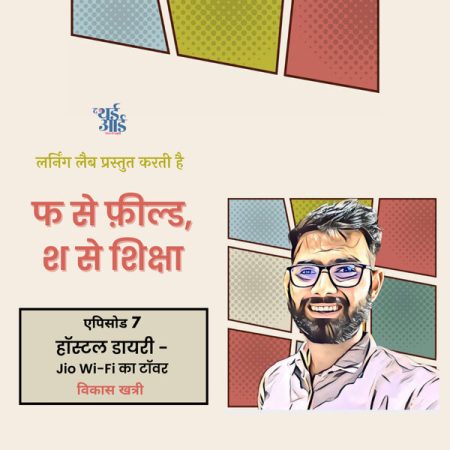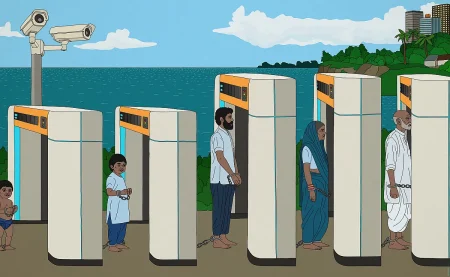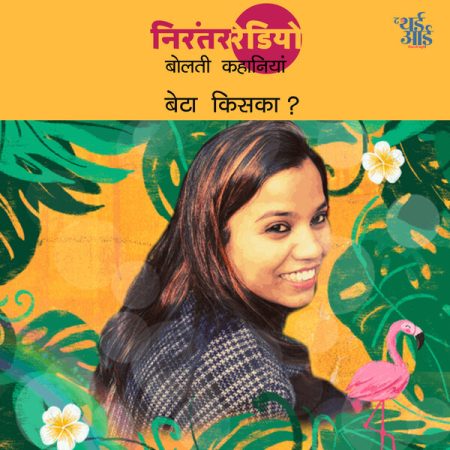Jyoti was the first girl from her village, Sawau Moolraj in Rajasthan to migrate to the city for a better education—a decision taken by her parents because the village had no such infrastructure. Since then, Jyoti has been an outsider-insider, moving in and out of her village home.
Jyoti likes to read and engage with new ideas and curiosities every single day. She finds her expression in words, paintings, and images. Her recent stint with the camera gave her a new perspective of looking at the world, which she aspires to juxtapose with her words.
Jyoti has participated in the Travel Log programme with The Third Eye for its City Edition. The Travel Log mentored 13 writers and image-makers from across India’s bylanes, who reimagine the idea of the city through a feminist lens.
Jyoti writes under an alter ego, Shri. “Shri is a girl who is half me, and half what I want to be. I wanted to live a lot like Shri and that’s how I did, through this story.”
‘…Got to run fast, we’ll miss the bus! The food is packed, ahaa! That sour smell of pickle and poori…am hungry already. Seats are almost full, I think we got to sit in the aisle…’
“Shri! It’s not Sunday. Get up and get milk for tea!” And there… the super exciting journey to Barmer ended. Damn, it was just a dream.
Rubbing her palms together and placing them on her eyes to warm them, Shri smiled and looked at the sky from her room on the terrace. The sun was hidden behind the fog. It was freezing cold.
She took the flask and ran to fetch the milk. Ajay’s wife, who sat behind the shop counter, was ready with her daily taunts, “Oh, so the sun finally rose for you, princess. Come late tomorrow and you’ll spend the day without tea!”
Shri doesn’t like speaking much in the morning. Does anybody? She took the flask and walked mindfully; she didn’t want to trip and spill the milk and suffer another round of abuse from her perpetually angry bai [grandmother].
Back home, it was all hustle and bustle.
Sweeping the house, folding the sheets, clearing her father’s ashtray, making tea for bai. She did all so gracefully that it was tough to believe she was only 13.
Shri is a dove in this village full of sparrows, or at least that’s what she thinks. Other people had other, less lovely, names for her: bandariya, chimni, maindak, chhamkudi! Shri was always spotted either dancing around in the patch of land just beside the house or collecting books, old and new, wherever she could find them. Although she couldn’t yet read properly, she was fond of the smell of old books, and the vibrant sketches in the new ones. She always moved her hands on the pages as if living the words.
Another peculiar habit of hers was collecting broken things. For the last three years, any metal, utensil, wooden piece, any broken thing she found, she brought them all home.
Shri is the only child in the family. A lot of her story is framed around this one fact. Her parents could not have any more children. Raksha Bandhan was the festival she hated the most.
In a village that normalises having as many girls as required until you have a boy, being a single child, that too a girl, was overwhelming for Shri.
But no one would disagree that Shri is a jolly girl. No one in her family supported her eccentricities though, except her papa.

Shri picked up her bag to run for school. The bag tumbled open, the strap has ripped. “Papa! I told you to get me a new bag!” Bai started shouting, as if on cue, even though the old lady had been pretending to pray till a moment ago. “We earn only for you, na? Sending you to school is already an extravagance for us.” Shri fled before she started arguing with her bai as always.
It was always like Shri never belonged here, not in this village, not with its mentality.
School was Shri’s happiest time. Except for the times girls bullied her for being not feminine enough.
Her teachers adored her for her curiosity, and because she loved scientific reasoning. She was the only girl clearing her doubts and answering questions in class.
Shri also liked school for the after-school time. She stayed back after school hours to meet Mohsin, who was a year ahead. He was a Muslim, the son of the village daakiya. Tall—almost as tall as the school gate—skinny, his bones peeping out from his dark and shiny skin. His eyes calm, deep, kajal giving them the finest outline. Mohsin was always quiet. It was Shri who is always talking around him. Shri loved Mohsin’s culture; their prayers, their clothes, kajal in the men’s eyes and the cap. But the village people looked down on them and that confused Shri. Mohsin’s father also has a tough time doing his job nowadays as many refuse to take their post from a Muslim’s hand.
It is not only the Muslims who bear the brunt of the Brahmins, Baniyas and the Rajputs but the Jogis, too.
The Jogis live far away from the main village, in between the sand dunes, in huts with tattered roofs.
Shri always met Mohsin after school. She knows she cannot be seen around him at all. Girls don’t talk to boys here, and a Muslim boy? Only if she wanted to be beaten hard!
Shri told Mohsin about last night’s dream. They were going to the shehar—to Barmer. Mohsin started laughing. “You and your crazy dreams.” It’s true that Shri had the weirdest dreams. She woke up in different moods depending on her dreams, and always in the hope they might turn into reality.
But things started changing after this other dream Shri had.
She dreamt that a book with a golden outline and the shiniest ever cover was hidden under the sand dunes close to her house. So, that freezing winter morning, Shri dragged her friend Ganga to the sand dunes, so that they could dig together.
They were on their way when they heard giggles. Behind the largest and holiest peepal of the village, the one with broken idols and photo frames at its roots, they heard giggles!

The two stopped, trying to hide and listen to these early morning adventurers. As the voices became clearer, they realised it was a boy and a girl. Ganga was the one to figure this out. She is the grandma of all in the matters of marriage, boys, love and romance. Her only real source of knowledge is the TV. And she has managed to glean all kinds of essential information from aunties in the village, who talk savagely about their husbands and curse their in-laws.
Shri realised it was a familiar voice. Ganga held her hand as they started walking towards the peepal tree. They saw it was Shero ba’s daughter-in-law and Mohsin!
Shri and Ganga’s mouths fell open wide enough to let in three golgappas.
Mohsin and Shero ba’s bahu [daughter-in-law] were equally shocked but also scared. Were they shivering because of the cold or fear of being caught?
For a few minutes, no one knew what to say. Shri broke the awkward silence, “What on earth are you two doing here? What are you looking for? If you find the book, I’m telling you now, I want you to hand it over to me!” she shouted, briefly forgetting that only she knew what she saw in her dream.
But the investigator in Ganga was wide awake now. “What are you two doing here? Isn’t it an odd place and time for sheep shearing? I mean, where are the sheep?”
Mohsin, otherwise not allowed into many houses of the village, was tasked with shearing the animals by the very same households. He started fumbling for words.
Roma, Shero ba’s bahu, said in a firm tone, “Look, I don’t take you to be fools. I know you both—Mohsin talks about Shri a lot. I know you two are very mature and trustworthy. This is nothing; I came to meet Mohsin, that’s all!”
But Ganga didn’t give up. “Really? Why would you two meet here, in this chilly morning?”
From where Roma came, women knew how to be bold and honest. She belonged to a nearby village, Kaanchi. She had married Shero ba’s son, Kishan, just four months ago. She didn’t like it much here. She was a ‘padhi likhi bahu’—she had studied till Class X—apparently unusual in the Meghwal caste.
Now, Roma was prettier than all the women in the village, and she probably had met Mohsin when he came to shear their sheep. They must have talked to each other. It was always funny to talk to Mohsin. He didn’t talk much, but whenever he did, his words were measured and thoughtful. In that moment, Shri’s thoughts shifted from the book in her morning dream to Mohsin: why had Mohsin never told her about his growing friendship with Roma?
It was starting to get brighter. The sun’s rays had risen above the horizon. Finally, Mohsin gathered up the courage, “I think we should all go home. Bhavru ba will soon be here for his morning walk and four of us seen together will be a big issue. Trust me, Shri, trust me, Ganga, it was just a normal meeting. I brought some blank postcards to Roma as she asked me to…. umm…. she wants to write letters to her friends; she loves to write letters. Please don’t tell anyone about this.”
Roma showed the postcards to the girls. “Yes, I only asked him to meet me here early because my mother-in-law wouldn’t like it if I asked him to bring me anything.”
With that, Shri said, “Yes, let’s go, I have to be at home or else I’ll be scolded.” She turned back, without looking at Mohsin. Ganga followed, still visibly charged up. Shri held Ganga’s hand and said in the most authoritative tone she could muster, “You don’t breathe a word about this to anyone. Anyone. Clear?” Ganga respected Shri enough to listen to her. Also, Shri sounded really serious, which she usually wasn’t.

Whenever things felt out of control and thoughts troubled her, she felt calm around her pitara, and her books.
She breathed deep, took in the old woody smell from the pages of her book. “What am I worried about?” she asked herself. The fact that she didn’t find that book she had dreamt of or that Mohsin had hidden something from her? Did she hate Roma?
It was Sunday, so Shri didn’t get a chance to meet Mohsin. She spent the day thinking about the morning but was distracted by her bai’s censures to her mother. Her father was out for work and bai never failed to miss a chance to scold her mother, mostly for no other reason but that she didn’t bear a son. Shri knew a little about the whole childbirth thing, but she didn’t know what her mother had failed to do. Or not do? Wasn’t her father also involved in the whole childbirth thing?
Shri wasn’t someone to run away scared. She picked up her bag and some courage, too.
Mohsin was where he always stood. He looked dull, nervous. Shri knew she had to be the one to break the awkwardness. She made some small talk.
Mohsin, relieved by Shri’s tone, began to speak. “I just went to meet Roma that day. She is a nice woman. She wanted to write to her friends. And also, because I like to talk to her. You know, she is very sweet, different from women here. She is a bit older than me but… it’s like… she is a child as well as a mature woman. I wonder how she can be both…” Shri listened keenly, without interrupting. She didn’t know what to say. Mohsin continued, “I wanted to tell you about her but I don’t know why I couldn’t.”
Shri said, “But Mohsin, she is Kishan’s wife! She is married, and she is Meghwal. You realise that?” Mohsin stared at her as if he had never thought about this. Shri’s words hit him hard, and it was clearly dawning on him how he couldn’t afford to feel what he felt for Roma.
Shri had never felt the emotion called ‘love’, not for a boy.
Shri wondered if her grandmother had always been this loud and rude and heartless.
Here is what Shri knew about her bai. Bai’s name is Phooli Devi. Women here are not known by their names. Instead they were referred to by their father’s names until they are married, and later by their husband’s or father-in-law’s name. Do they end up forgetting their names, too? But Shri remembered her bai’s name.
What Shri perhaps didn’t really know, or only half-knew, was that Phooli Devi was once a quiet, sensitive, beautiful, shy girl. She married, Bikha Ram, Shri’s late grandfather, at the age of 12. Too young to be married, but not back then. She learned pretty much everything about the world after her marriage. Phooli Devi had had five children—three girls and two boys. Two died soon after birth. Her only son was Shri’s father. She was fond of her daughters too, not much though. Her behaviour towards girls made Shri think she hated women. Everyone said she had become this harsh after she lost her youngest son to pneumonia. Ever since then, she thought maybe her son might return to her as a grandson. This pretty much explained her wrath towards Shri’s mother.

Shri didn’t sleep well that night, even though she was very tired. Unanswered questions were her weakness. The next day, she went to school but didn’t stay back. Mohsin kept waiting for her.
A little later in the day, Mohsin bumped into Roma again. This time, he didn’t talk to her. He didn’t even meet her eye.





